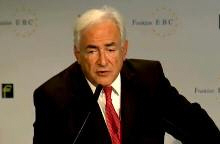
Typical street scene in Santa Ana, El Salvador. (Photo: iStock)
IMF Survey: Europe Needs Reforms to ‘Break Shackles of Low Growth’
November 19, 2010
- Stronger growth, job creation are priorities for Europe
- Collaborative reforms necessary to safeguard European social model
- Stronger financial, more integrated labor markets needed
Europe needs collaborative and far-reaching reforms to restore strong and balanced growth across the region and safeguard the European social model, the head of the International Monetary Fund Dominique Strauss-Kahn told bankers and officials in Frankfurt.

IMF chief Dominique Strauss-Kahn in Frankfurt: European countries must be willing to cede more authority to European institutions (photo: IMF)
THE ROAD AHEAD FOR EUROPE
“Europe must break the shackles of low growth and stop settling for second best,” said Strauss-Kahn. “This is the only way to save the social model and fulfill the common European destiny.”
Speaking to the European Banking Congress in Frankfurt, Germany, on November 19, Strauss-Kahn said the only answer is for more cooperation and greater integration, and now is the time to fortify the economic foundations of the union.
Europe’s social model that includes generous safety nets and protection for the disadvantaged is under threat because of high costs and growing public debts.
A stronger role for the center
The IMF chief outlined a number of areas for collective action, ranging from the financial sector, to a single labor market initiative. Only a collaborative approach driven by the center can bring about the reforms needed to secure stability, create jobs and ensure long-term growth.
To achieve these wide-ranging reforms, individual European countries must be willing to cede more authority to European institutions.
“When the agenda is left with nations, things stall,” said Strauss-Kahn. He added that peer pressure has not served Europe very well, and it’s time to change course.
In the key budgetary area, Strauss-Kahn outlined two ways of moving toward strengthened central authority. One would be to shift the main responsibility for enforcement of fiscal discipline and key structural reforms away from the European Council, and toward an independent body, such as the European Commission—the union’s executive body. Another would be to increase the size of centrally-allocated budgetary resources.
Strauss-Kahn’s remarks come ahead of a new IMF staff study on growth in Europe to be released next week.
Strengthen supervision of financial sector
Earlier in the day, Strauss-Kahn welcomed progress on new global banking rules, known as Basel III, but said there is a long list of problems that have not been resolved. Countries still need to strengthen the supervision of the rules, and resolve unviable financial institutions, particularly cross-border banks.
Speaking on a panel with U.S. Federal Reserve Chairman Ben Bernanke, European Central Bank President Jean-Claude Trichet, and Brazil’s central bank President Henrique Meirelles, the IMF managing director said work is under way on these tougher issues but it needs to speed up.
“Being ready for the next crisis is important, not only for economic reasons, but also for democratic ones,” said Strauss-Kahn. “Trust in institutions may be under threat if we have another crisis that looks like the previous one and the reaction is: ‘did you fix the problem?’”
Strauss-Kahn also said more work needs to be done on the risks posed by non-bank financial institutions, such as hedge funds and pension funds, and the interaction between the financial sector and the global economy, which may change part of the work of central banks.
“I don’t know if central bankers are happy to hear someone say you should extend the role you play, but I think that’s unavoidable.”


